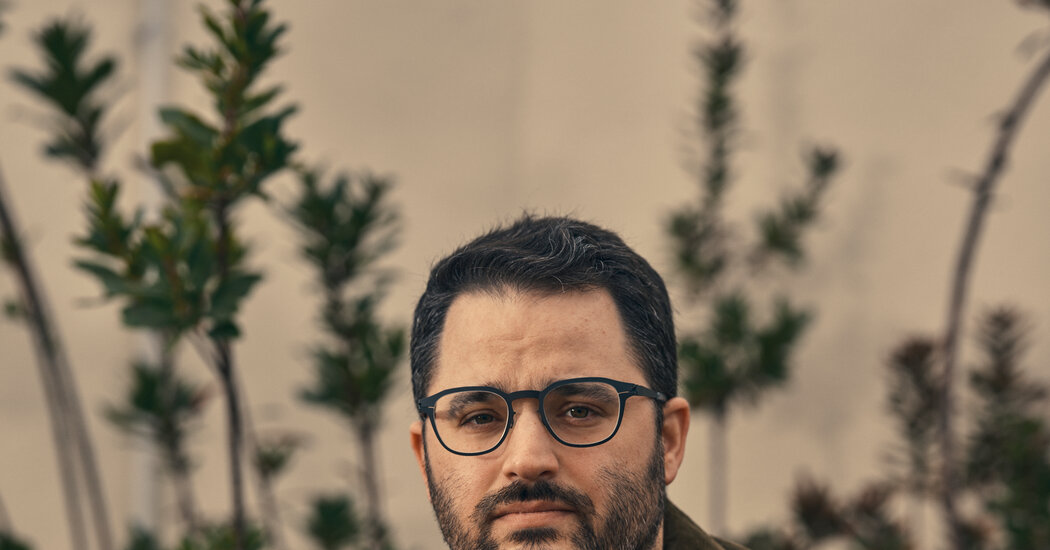During a 24 -hour oscillation through Copenhagen last month, Eric Slesinger met engineers who produced maritime drones, war planning software developers and NATO consultant. He had recently visited London for a dinner with a high British intelligence official and he would soon go to the Arctic to know the technologies that could manage extreme climates.
The crowded program would seem more common for Mr. Slesinger in his former work as an officer of the Central Intelligence Agency. But now the 35 -year -old was in great demand while he spoke his credentials of the espionage agency in a career as a capitalist of venture capital centered on the suddenly relevant area of defense and national security technology in Europe.
“All this is happening at the warp speed,” Slitesinger said, who supported eight defense start-ups and negotiated many others.
While President Trump questioned the future of the transatlantic report, governments of all of Europe have outlined plans to potentially spend hundreds of billions of euros in arms, missile defense programs, satellite systems and other technologies to reconstruct their armies. Technologists, entrepreneurs and investors are running to take advantage of the expense boom by creating new defense start-ups.
Few be paid four years ago, when Mr. Slesinger moved to Madrid with the idea that Europe should have drastically increased the expense for the defense because the military protection of the United States could not be taken for granted. Now his predictions seem prescientific. After the inauguration of Mr. Trump, who followed his defeat for the vice -president Kamala Harris in the November elections, the members of his administration called the “pathetic” Europe and the military moooche of the United States.
“Whether Trump won either Harris or anyone else, the fact would have remained that there is a recovery of the technology that must happen in Europe,” said Slesinger while walking among the meetings in Copenhagen last month. “Maybe it’s accelerated in certain ways, but this has been a long time.”
Mr. Slesinger is now in the unusual position of an former American intelligence officer who is trying to profit from the military transformation planned in Europe. His individual risk capital company, 201 Ventures, is completing a 22 million dollar fund to invest in young start-ups in the intersection between technology and national security.
The initial investments of Mr. Slesinger include a company of maritime drones in Sweden, a manufacturing manufacturer of manufacturing technology in Great Britain, an artificial intelligence society in Greece and a hypersonic start-up of vehicles in Germany.
The United States have a long tradition of investments in defense-la Silicon Valley was started in part with the financing of the Pentagon-e saw the rise of several start-ups focused on the military, such as Palantir and Andril. Europe has had fewer successes, in part because the defense companies have been considered so non -ethical that many investors have refused to put the money behind them.
“There has been this moment of awakening and it will involve a dramatic increase in spending in defense, safety and resilience technology,” said Chris O’Connor, partner of NATO Innovation Fund, a 1 billion euro technological fund started with money from 24 members of the organization of the treaty of the North Atlantic, although not in the United States.
The born fund is the largest financial supporter of the company of Mr. Slesinger. O’Connor said that Slesinger’s national security experience made him ideal to identify companies with technology that could win government contracts.
“It will end up playing a critical role,” said O’Connor.
Mr. Slesinger grew up just outside Washington, DC, and attended Stanford. There, it was an extraordinary in the mechanical engineering program, said Craig Milroy, co-director of the Stanford product of the product, in which students can make hardware ideas.
While many of Mr. Slesinger’s classmates of Stanford have explored work with Apple or Google, he sought elsewhere. “One day he entered my office and said,” I’m asking me to join the CIA, “Milroy said.” It hasn’t happened before or since then. “
Mr. Slesinger is Cagey for his five and a half years old who work on the CIA, but with his engineering background, he said, he worked among multiple figures similar to Q of James Bond’s films, Geek operating in the background to solve the technical problems for the field of intelligence on the field.
“Imagine being a student, a kind of nerd engineer, and then you can go to this place where you have a capacity similar to a Santa Claus seminar,” he said. “Intelligence problems are really difficult, they are gnarled and you feel a real responsibility to do something to solve the problem. “
In 2019, Slesinger returned to the agency to attend the Harvard Business School. He also spent a summer working for the Venture Cia capital Fund, in-Q-Mel.
In this period, it has been set on the idea that Europe should reconstruct its military after a generation of low investment. The United States spent about $ 880 billion in defense in 2024, more than double what the other NATO countries have combined.
With the United States concentrated on China, Slesinger was convinced that he would see the end of the so -called dividend of peace, which allowed European countries to spend more in social services and pensions from the Second World War, rather than on tanks and combat jets.
The Russian invasion of Ukraine in 2022 further crystallized his thesis. He then started the European network for defense investors, which now includes about 125 investors, entrepreneurs and politicians. Last year Ventures started 201.
Initially, he fought to collect funding because many investors have refused to support military technologies. But in the end he raised funds from NATO and found consultants including Eileen Tanghal, who supervised the London office of In-Q-Mel; David Ulevitch, a general partner of the Silicon Valley adventure company AndreeSsen Horowitz; And the author Sebastian Mallaby.
In the last 12 months, Mr. Slesinger, who also has an Italian passport from his family’s roots, has traveled to 15 countries. During a recent trip to the Arctic, he ridden a snowmobile towards a remote area considered to test new food sources and a communication technology. In Switzerland, he visited the most powerful particle accelerator in the world.
In February, Mr. Slesinger was in Germany for Munich’s security conference when vice -president JD Vance held a speech from blisters who criticized Europe. Within a few weeks, Germany, France, Great Britain and other European countries have committed themselves to significantly increase military spending, alarmed by the fact that they could no longer count in the United States as a reliable ally.
“It looked like a sea change,” said Slesinger, who saw Mr. Vance’s speech from a laptop in a nearby hotel. “You could hear him while talking.”
How much new expenses will reach start-ups is not clear. The missiles, ammunition and combat jets are probably higher priorities than the technology of small unrelated companies.
Slesinger said that they would have taken years to measure success, but he expects to spend his 22 million dollar fund in the next two years and has already started thinking of collecting a greater amount. In recent months, he has been full of shots of European entrepreneurs suddenly interested in creating military technology.
For almost all those he meets in Europe, is there an annoying question: no longer work for the CIA?
“I’m really out!” he said.





